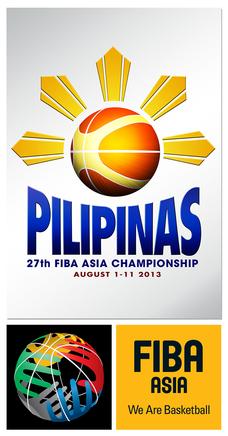
The FIBA Basketball World Cup is an international basketball competition between the senior men's national teams of the members of the International Basketball Federation (FIBA), the sport's global governing body. It takes place every four years and is considered the flagship event of FIBA.
The Philippines men's national basketball team, commonly known as Gilas Pilipinas, is the basketball team representing the Philippines. The team is managed by the Samahang Basketbol ng Pilipinas.

The Australia men's national basketball team, nicknamed the Boomers after the slang term for a male kangaroo, represents Australia in international basketball competition.

The Australia women's national basketball team, nicknamed the Opals after the brightly coloured gemstone common to the country, represents Australia in international basketball. From 1994 onwards, the Opals have been consistently competitive and successful having won nine medals at official FIBA international tournaments, highlighted by a gold medal winning performance at the 2006 World Championship in Brazil. At the now-defunct regional Oceania Championship for Women, the Opals won 15 titles. In 2017, FIBA combined its Oceanian and Asian zones for official senior competitions; following this change, the Opals compete in the FIBA Women's Asia Cup.

The FIBA Asia Cup is an international basketball tournament which takes place every four years between the men's national teams of Asia and Oceania.
FIBA Oceania Championship was the Oceania basketball championships that took place every two years between national teams of the continent. Through the 2015 edition, the Oceania Championship was also a qualifying tournament for the Basketball World Cups and Olympic Games.

The Qatar national basketball team represents Qatar in international basketball competitions. It is administered by the Qatar Basketball Federation. The team won two bronze medals at the Asian Basketball Championship and belongs to the major contenders among Arab nations.

The China men's national basketball team represents the People's Republic of China in international basketball tournaments. The national team is governed by the Chinese Basketball Association (CBA). Based on the number of tournament titles, China is considered a major basketball powerhouse in Asia and has by far the most successful basketball program on the continent.
The FIBA Men's World Ranking are FIBA's rankings of national basketball teams. FIBA ranks both men's and women's national teams for both senior and junior competitions. It also publishes combined rankings for all mixed-sex competitions. Not included are the rankings for three-on-three competitions, which are tabulated for individual players.

The Iran national basketball team is controlled by the IR Iran Basketball Federation. Overall, the team won three out of the last five FIBA Asia Championship tournaments.

The India men's national basketball team represents India in international men's basketball. It is controlled by Basketball Federation of India. The team made significant improvements as the sports of basketball is becoming more popular.

The Kazakhstan national basketball team represents Kazakhstan in basketball international competitions. They belong to the FIBA Asia zone.

The FIBA Intercontinental Cup, also commonly referred to as the FIBA World Cup for Champion Clubs, or the FIBA Club World Cup, is a professional basketball clubs competition that is endorsed by FIBA and the NBA. Historically, its purpose has been to gather the premier basketball clubs from each of the world's geographical zones, and to officially decide the best basketball club of the world, which is officially crowned as the world club champion. The World Cup for Clubs has been contended mainly by the champions of the continents and/or world geographical regions that are of the highest basketball levels.

The 2009 FIBA Asia Championship for Men was the biennial Asian continental championship and also served as the FIBA Asia qualifying tournament for the 2010 FIBA World Championship. The tournament was held from August 6 to 16, 2009 in Tianjin, China.

The Indonesia men's national basketball team represents the Republic of Indonesia in international basketball competitions. The governing body of the team is the Persatuan Bola Basket Seluruh Indonesia.

The International Basketball Federation is an association of national organizations which governs the sport of basketball worldwide. FIBA defines the rules of basketball, specifies the equipment and facilities required, organizes international competitions, regulates the transfer of athletes across countries, and controls the appointment of international referees. A total of 212 national federations are now members, organized since 1989 into five zones: Africa, Americas, Asia, Europe, and Oceania.
The qualification for the 2013 FIBA Asia Championship was held in late 2012 from early 2013 with the Gulf region, West Asia, Southeast Asia, East Asia, Central Asia and South Asia each conducting tournaments.

The 2013 FIBA Asia Championship for Men was the intercontinental championship for basketball organized by FIBA Asia that served as the qualifying tournament for the 2014 FIBA Basketball World Cup in Spain. The tournament was held from August 1–11 in Metro Manila, Philippines. Beirut, Lebanon was supposed to host the tournament but the hosting rights was given to the Philippines citing the Syrian Civil War and security concerns in the Middle East in general. This was also the last Asian Championships that served as the qualifying round for the FIBA Basketball World Cup, as a qualifying window was used starting 2019.

The 2013 FIBA Asia Champions Cup was the 24th staging of the FIBA Asia Champions Cup, the international basketball club tournament of FIBA Asia. The tournament was held in Amman, Jordan in September 13–21, 2013. The main venue was the Prince Hamzah Court. This marked the first occasion when Jordan have hosted any FIBA Asia event.

The FIBAWest Asia Super League (WASL) is an international basketball league organised by FIBA Asia, consisting of clubs from West Asia and Gulf regions, in addition to the representatives of South Asia and Kazakhstan. The league was announced in 2022 and started with the inaugural season from December, until June 2023.















